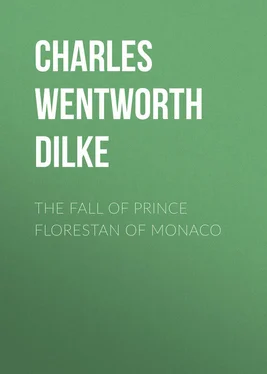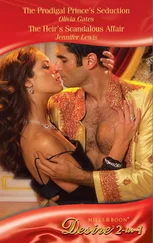Charles Dilke - The Fall of Prince Florestan of Monaco
Здесь есть возможность читать онлайн «Charles Dilke - The Fall of Prince Florestan of Monaco» — ознакомительный отрывок электронной книги совершенно бесплатно, а после прочтения отрывка купить полную версию. В некоторых случаях можно слушать аудио, скачать через торрент в формате fb2 и присутствует краткое содержание. Жанр: foreign_antique, foreign_prose, на английском языке. Описание произведения, (предисловие) а так же отзывы посетителей доступны на портале библиотеки ЛибКат.
- Название:The Fall of Prince Florestan of Monaco
- Автор:
- Жанр:
- Год:неизвестен
- ISBN:нет данных
- Рейтинг книги:4 / 5. Голосов: 1
-
Избранное:Добавить в избранное
- Отзывы:
-
Ваша оценка:
- 80
- 1
- 2
- 3
- 4
- 5
The Fall of Prince Florestan of Monaco: краткое содержание, описание и аннотация
Предлагаем к чтению аннотацию, описание, краткое содержание или предисловие (зависит от того, что написал сам автор книги «The Fall of Prince Florestan of Monaco»). Если вы не нашли необходимую информацию о книге — напишите в комментариях, мы постараемся отыскать её.
The Fall of Prince Florestan of Monaco — читать онлайн ознакомительный отрывок
Ниже представлен текст книги, разбитый по страницам. Система сохранения места последней прочитанной страницы, позволяет с удобством читать онлайн бесплатно книгу «The Fall of Prince Florestan of Monaco», без необходимости каждый раз заново искать на чём Вы остановились. Поставьте закладку, и сможете в любой момент перейти на страницу, на которой закончили чтение.
Интервал:
Закладка:
Fired with the enthusiasm of my party and of my age, I had subscribed to the Woman’s Suffrage Association, to Mr. Bradlaugh’s election expenses, to the Anti-Game-Law Association, and to the Education League. My reading was less one-sided than my politics, and my republicanism was tempered by an unwavering worship of “Lothair.” Mr. Disraeli was my admiration as a public man – a Bismarck without his physique and his opportunities – but then in politics one always personally prefers one’s opponents to one’s friends. As a republican, I had a cordial aversion for Sir Charles Dilke, a clever writer, but an awfully dull speaker, who imagines that his forte is public speaking, and who, having been brought up in a set of strong prejudices, positively makes a merit to himself of never having got over them. This he calls “never changing his opinions.” For Mr. Gladstone I had the ordinary undergraduate detestation. There are no liberals at Cambridge. We were all rank republicans or champions of right divine.
The 31st of January was a strange day in my history. On entering my rooms in my flannels, hot from the boats, and hurrying for hall, I saw a telegram upon the table. I tore it open.
“His Serene Highness!” Surely a mistake! I read on.
“This morning at noon his Serene Highness the reigning prince was committed by the princess his mother to the care of M. Henri de Payan, at Nice. The princess being nervous about railway accidents, the departure for Monaco took place by road. The carriage conveying his Serene Highness and M. de Payan was drawn by four horses. Turbie was reached without mishap, but half-way between Turbie and Roquebrune, at a sharp turn in the road, the horses took fright, and the coachman, in avoiding the precipice, threw the carriage upon the rocks on the mountain side of the road. His Serene Highness was thrown on his head and killed on the spot. Your Serene Highness is now reigning prince of Monaco, and will be proclaimed to-night after the meeting of the Council of State by the style of Florestan II. Lieutenant Gasignol, of the guard, will proceed at once to England and meet your Serene Highness at any spot which your Highness may please to indicate. M. de Payan escaped without a scratch.”
Prince of Monaco! Prince of Monaco. And I had seen Lafont in Rabagas ! I was not a “milk-and-water Rabagas,” as Mr. Cole called Mr. Lowe, when all the papers reported him to have said “milk-and-water Rabelais,” and the Spectator mildly wondered at the strangeness of the comparison. No, but I was somewhat of a milk-and-water Prince of Monaco after Lafont. What distinction! What carriage! If the princes of the earth were only like the princes of the stage, there would be no republicans. But then, fortunately, they are not. “Fortunately!” and I one of them. What am I saying?
Poor little fellow! How sad for his young mother too. A reigning prince for nineteen hours, and that outside of his own dominions and at the age of six. A strange world! and a strange world, for me too. A half-Protestant, half-free-thinking, republican, German, Cambridge undergraduate, suddenly called to rule despotically over a Catholic and Italian people. My succession, at least, would be undisputed. No one had ever vowed that I “should never ascend the throne – without a protest.” One of the Grimaldis had a claim which was no doubt a just one, my respected great uncle having been probably a usurper; but Marshal MacMahon and the Duc de Broglie would, I well knew, support me, preferring even a German prince at Monaco to an Italian. My succession, I repeat, was undisputed; but if anybody had taken the trouble to dispute it, I can answer for it that they would have been cheated out of their amusement, for I should willingly have resigned to their charge so burdensome a toy. I was that which the republican mayor of Birmingham, Mr. Joseph Chamberlain, in his jocular speech proposing the Prince of Wales’ health at the mayor’s banquet, said that one of his friends had been trying by argument to make the Prince – with, “as yet,” only “partial success” – a republican King. I would have gone only to Monaco to proclaim the republic had I not known that the strange despotism – presided over not as a despotism should be by one clever despot, but by two stupid despots, the Dukes of Magenta and Broglie – which is called the French republic, would not permit the creation of a small model for herself in the middle of her commune of Roquebrune.
I was not sorry to leave Cambridge. My rooms in the new court overlooked Caius, where they had typhoid fever; and between the fear of infection and the noise of the freshmen’s wines in Trinity Hall, I was beginning to have enough of Cambridge. My bedmaker and tutor were the only people to whom I bid goodbye. The men were all in hall and out at wines, and I left notes for my friends instead of looking them up in their rooms. I caught my tutor as he was going into hall. I told him of the news, and I could see the idea of an invitation for next winter to the castle at Monaco pass through his mind as he assured me that my rule would be a blessing to my country, and that nothing could better fit me for a sceptre than the training of an English gentleman. He added, with a return of the grim humour of a don, that he supposed that as a sovereign prince I need scarcely “take an exeat .” My poor old bed-maker, who had read the telegram in my absence from my room, called me “your imperial majesty” three times while she packed my shirts, but in half-an-hour I was off to London; and on the evening of the 3rd of February I met M. de Payan and Lieutenant Gasignol by appointment at the Grand Hotel at Paris.
From M. de Payan I obtained my first accurate ideas as to the State of Monaco. I found that I was not more independent under the supremacy of France than is the Emperor William independent under the domination of Prince von Bismarck. I had not only the Code Napoléon, and a Council of State dressed in exact copies of their Versailles namesakes, but French custom-house officers levying French custom-house duties in my dominions. At the beginning of our conversation I had said to M. de Payan, “Between ourselves, and fearing though I do that like Charles I. of England I may be committing high treason against myself, I feel bound to tell you that my only ideas of my principality are derived from M. Sardou’s Rabagas .”
Why is it that inhabitants of small and isolated communities never can see a joke? M. de Payan, slightly drawing himself up and speaking with as much stiffness as he could assume towards his prince, gravely answered me, “Your Serene Highness is not aware, I presume, that Rabagas was a satire directed against France in her decline, and not against your Highness’s principality.”
M. Sardou wasting his hours on satirising Monaco. I will never joke again, I said to myself, unless I should suffer the modern fate of kings and be deposed.
“M. de Payan,” I replied, “I am aware of what you say, and I was joking.”
“We have no Gambettas at Monaco, your Highness; that is all I meant.”
“Perhaps, Sir, the country would be happier if you had. Rabagas was not Gambetta, but Emile Olivier – not the man who never despaired of France, but the man who sacrificed his opinions to his advancement. I admire M. Gambetta, who is at this moment the first man in France, in my estimation, and the second political man in Europe. His figure will stand out in history, daubed as even it is with the mud that French politicians are ceaselessly flinging at each other.”
“M. Gambetta is, as your Serene Highness says, a man of extraordinary powers; but his father was a tradesman at Cahors, and is retired and lives at Nice, near your Serene Highness’s dominions.”
Читать дальшеИнтервал:
Закладка:
Похожие книги на «The Fall of Prince Florestan of Monaco»
Представляем Вашему вниманию похожие книги на «The Fall of Prince Florestan of Monaco» списком для выбора. Мы отобрали схожую по названию и смыслу литературу в надежде предоставить читателям больше вариантов отыскать новые, интересные, ещё непрочитанные произведения.
Обсуждение, отзывы о книге «The Fall of Prince Florestan of Monaco» и просто собственные мнения читателей. Оставьте ваши комментарии, напишите, что Вы думаете о произведении, его смысле или главных героях. Укажите что конкретно понравилось, а что нет, и почему Вы так считаете.












